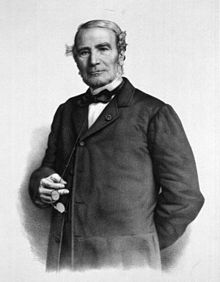Antoine Bussy
| Antoine Bussy | |
|---|---|

French chemist Antoine Alexandre Brutus Bussy
|
|
| Born | 29 May 1794 Marseille |
| Died |
1 February 1882 (aged 87) Paris |
| Residence | Marseille |
| Nationality | French |
| Fields | chemistry |
| Known for | beryllium |
| Influenced | Roburque |
Antoine Alexandre Brutus Bussy (29 May 1794, Marseille – 1 February 1882, Paris) was a French chemist who primarily studied pharmaceuticals.
Antoine Bussy entered the École Polytechnique in 1813, and there followed the courses delivered by Pierre Robiquet, the great French chemist who was to make decisive breakthroughs in bio-chemistry (he isolated the first amino-acid ever identified, asparagin, in 1805-1806), in industrial dyes (he isolated and identified alizarin, the most famous and first modern industrial red dye) and the pick-up of modern medication (he isolated, identified and started mass production of codeine, 1832). Robiquet tutored Antoine Bussy in his career as a chemist researcher and in his private career as pharmacist as well. In 1831 Antoine Bussy published the 'Mémoire sur le Radical métallique de la Magnésie' where he described a method of preparing magnesium by heating magnesium chloride and potassium in a glass tube. When the potassium chloride was washed out, small globules of magnesium remained. Bussy became famous for this action.
Bussy and Friedrich Wöhler are each credited with independently isolating the element beryllium in August 1828 by reacting potassium and beryllium chloride.
Antoine Bussy became a President of the Académie de Medecine, and later on (1868) of the Académie de Pharmacie.
...
Wikipedia
